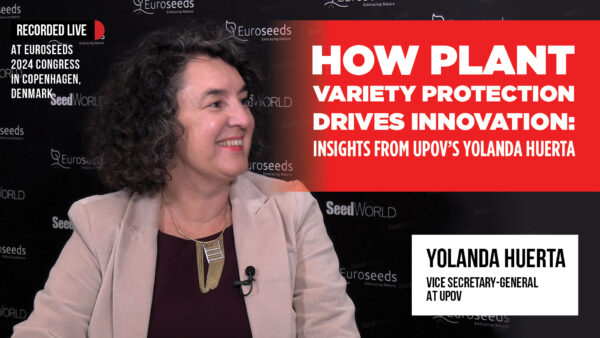Industry News is geared to seed professionals and delivers the people, industry, business and product news you need to know. Submissions are welcome. Email us at·news@issuesink.com.
People News
Haplotech, a privately-owned and independent technical service provider in plant breeding, has hired Roger Watts to assume responsibilities in business development and project management. Watts will take the lead on several new projects including P3 Hybrids programs in wheat and canola. Previously, Watts was a DuPont Pioneer senior research associate.
Syngenta has hired Ryan Findlay as industry relations lead for cereals and diverse field crops, including sugarbeets, sunflowers and alfalfa. Findlay will manage the company’s relationships with commodity and agricultural associations. Terry Stone has been appointed industry relations lead for vegetable and specialty crops. Jill Wheeler has been named head of sustainable productivity in North America and will be responsible for ensuring The Good Growth Plan from Syngenta is embedded into the company’s North American business and stakeholder engagement plans.
Dow AgroSciences has announced a new leadership structure for its businesses in North America. Rajan Gajaria has been promoted to the new position of global leader of North America and Latin America. Gajaria succeeds Stan Howell, who has been named global general manager for AgroFresh, a DOW business that is a global leader in advanced proprietary technologies for the horticulture and agronomic markets. In addition, DOW announced three new management roles in the U.S. regional commercial unit. Susanne Wasson has been named U.S. crop protection leader. Ben Kaehler will take on the new role of U.S. sales leader, while Brian Barker has been named general manager of U.S. Seeds.
The board of directors of Keygene Inc. has appointed Fayaz Khazi as CEO, effective immediately. “We are confident that under Fayaz’s leadership, Keygene Inc. will continue with the development of innovative crop improvement research and will expand our business in North and South America with emphasis on major American crops, such as soybeans and corn,” says Arjen van Tunen, chairman of the board of directors and CEO of Keygene N.V.
BioDiagnostics Inc., an independent seed testing laboratory serving the needs of the global seed industry, has added Farhad Ghavami as manager of molecular breeding and genomic technologies. With Ghavami’s guidance, BDI will expand its DNA extraction services by offering a high-throughput pure DNA extraction service for less than the cost that most seed companies spend on do-it-yourself kits. Ghavami will also spearhead BDI efforts to increase its level of genomic selection and association mapping services, upgrade the current bioinformatic offerings and make molecular breeding a more accepted and understood practice in the industry.
Product News
KeyGene has announced that the automated and robotized plant phenotyping facility, known as PhenoFab, has expanded its digital phenotyping service portfolio for additional crop and seed applications. The new phenotyping applications allow the crop protection industry to test and precisely measure the effects of their products on the growth of plants and their well-being. Such studies help to precisely define the combined effects of the seed/chemical/biological treatment on the growth of various crops for different genotypes under different growing conditions. The ability to measure even the smallest growth differences provides customers vital feedback to improve their products and boost their research and development efforts, according to KeyGene.
A new agreement provides CNH Industrial N.V. and The Climate Corporation the opportunity for factory integration of select precision planting technology into CNH Industrial agricultural planters designed to optimize planting performance. The non-exclusive agreement “will allow CNH Industrial to provide producers the next level of customization and seed delivery technology in the market,” says Dave Larson, CNH Industrial vice president, agricultural equipment portfolio strategy. “It will allow us not only to pair the technologies and services of our companies, but to evolve them together to deliver significant improvements in planting efficiency and yield.”
Business News
Pinnacle Agriculture Holdings LLC has acquired Frontier Chemical LLC. Headquartered in Beattie, Kansas, Frontier Chemical was formed in 2007 providing crop protection chemicals for area growers. The business has grown 10-fold from its original volume, as it continues to provide a full line of chemical products, as well as select seed products. Pinnacle has also acquired Harvey’s Agricultural Solutions LLC and 3-D Agronomy. Michigan-based Harvey’s will operate as part of Pinnacle’s Providence Agriculture brand. Harvey’s two locations will provide ag solutions including fertilizer, crop protection chemicals, seed and other value-added services.
Precision BioSciences Inc. has been working with Syngenta to develop advanced agricultural products using the first fully-synthetic genome editing technology. Researchers at Syngenta have successfully used engineered nucleases based on Precision’s proprietary ARCUS technology to insert genes of interest into desired locations in the corn genome with unprecedented efficiency. The ARCUS-derived nucleases were found to be highly effective, leading to an extension of the Precision-Syngenta collaboration.
Evogene Ltd., a plant genomics company that specializes in enhancing crop productivity, has entered into the field of plant insect resistance and control. The company’s initial activities will focus on developing seed traits, which display resistance to corn rootworm and soybean aphids. Evogene’s insect-resistance activities will focus on an innovative approach to the discovery of microbial genes responsible for insecticidal activity. “The first insects to be targeted are two of the industry’s most devastating insects,” says Ofer Haviv, Evogene’s president and CEO.
Bayer CropScience has officially opened its North American Bee Care Center at its headquarters in Raleigh, N.C. The $2.4-million center brings together significant technological, scientific and academic resources, with the goal of promoting improved honey bee health, product stewardship and sustainable agriculture.
The global strategic relationship between the Royal Barenbrug Group and Dow AgroSciences has led to the opening of Barenbrug do Brasil, which specializes in plant breeding, seed production and processing of pasture seeds, including Brachiaria hybrids and forage legumes, for the Brazilian market. With the most modern and advanced seed processing and coating line in Latin America, Barenbrug will focus on high-quality seed. Barenbrug do Brasil’s grass breeding facilities will concentrate on producing a portfolio of tropical and temperate grasses.
Industry News
A new report from PG Economics titled GM Crops: Global Socio-Economic and Environmental Impacts 1996-2012, reveals that crop biotechnology continues to provide major environmental benefits and allows farmers to grow more, while using fewer resources. “Half of the farm income gains and the majority of the environmental gains associated with changes in pesticide use and reductions in greenhouse gas emissions occurred in developing countries,” says Graham Brookes, director of PG Economics and co-author of the report.
The third National Climate Assessment report has been released and is similar to previous climate assessments. The authors conclude that climate change is already happening across the U.S. The report documents how climate change is altering agriculture and forestry systems and evaluates how these systems are likely to be affected. The authors found that climate disruptions to agricultural production have increased i
n the past 40 years and are projected to increase during the next 25 years. By mid-century, these impacts will be increasingly negative on most crops and livestock. Many agricultural regions will experience declines in crop and livestock production from increased stress due to weeds, diseases, insect pests and other climate change-induced stresses.
Iowa State University engineers and plant scientists are working together to design better crops that will tolerate climate change, produce higher yields and feed more people. The effort to develop smart plants brings combines engineers, who are fluent in measuring water and nutrient flows, running high-performance computer simulations and visualizing huge amounts of complex data, with plant scientists, who can breed and improve plants, identify plant traits, understand genomics and study soil and environmental impacts on plants. The team, led by Daniel Attinger, ISU associate professor of mechanical engineering, will attempt to use the principles of engineering and physics in plant breeding.
DuPont Pioneer scientists have made a significant advancement in developing corn plants that successfully withstand drought stress. In an upcoming edition of Plant Biotechnology Journal, Pioneer scientists reveal a new finding that higher-yielding corn plants succeed under drought conditions when naturally occurring ethylene stress hormone levels in the plant are reduced through a transgene. “It’s not just about improving productivity for farmers, we also need to maintain and improve sustainability of our land and water resources,” says Jeff Habben, DuPont Pioneer scientist and lead author of the article.
A new study shows that soybean plants can be redesigned to increase crop yields, while requiring less water and helping to offset greenhouse gas warming. The study is the first to demonstrate that a major food crop can be modified to meet multiple goals at the same time. Led by Darren Drewry of NASA’s Jet Propulsion Laboratory in Pasadena, California, the study found that by redesigning soybean plants in various ways, it’s possible to increase soybean productivity by 7 percent without using more water. Soybean plants also could be redesigned to use 13 percent less water or to reflect 34 percent more light back to space without a yield loss. The study has been published in Global Change Biology.
The International Wheat Genome Sequencing Consortium has announced that it will receive approximately €1 million during the next six months from Bayer CropScience to support physical mapping of several wheat chromosomes. The goal of Bayer’s contribution is to accelerate the consortium’s wheat genome sequencing effort by enabling the completion of physical maps for all 21 chromosomes. These maps are the foundation for obtaining a complete reference sequence of the hexaploid bread wheat genome, expected by 2016-17. The DNA sequence of the wheat genome will provide an essential tool for identifying and studying the function of wheat genes.













